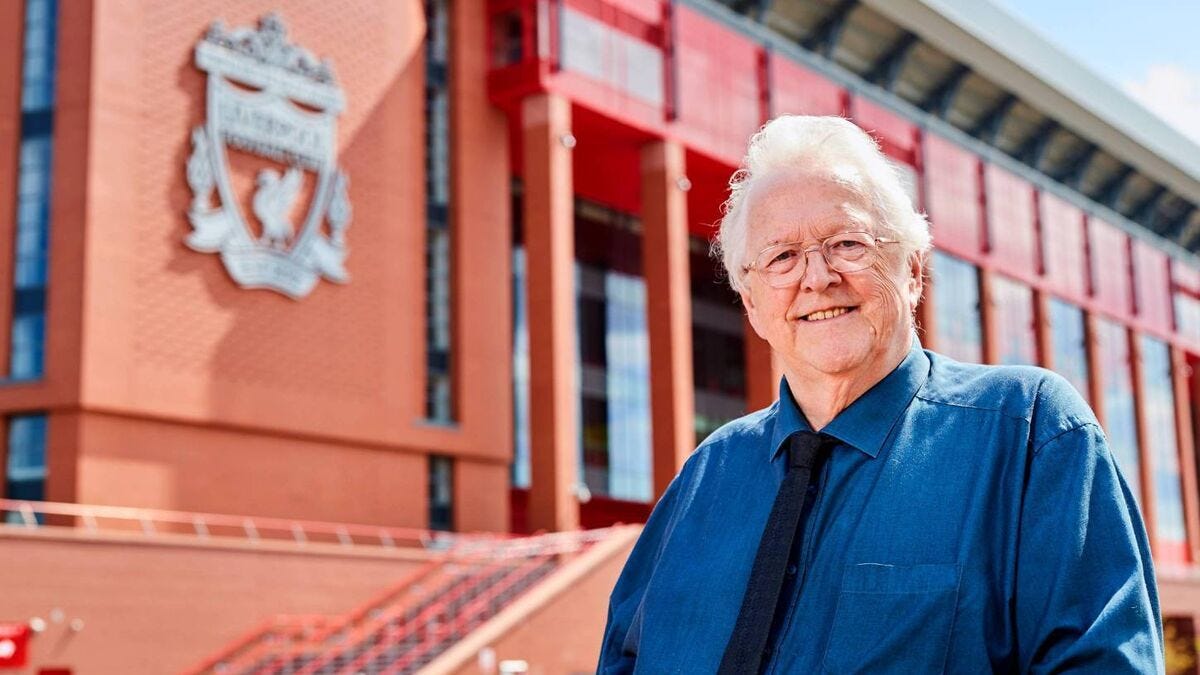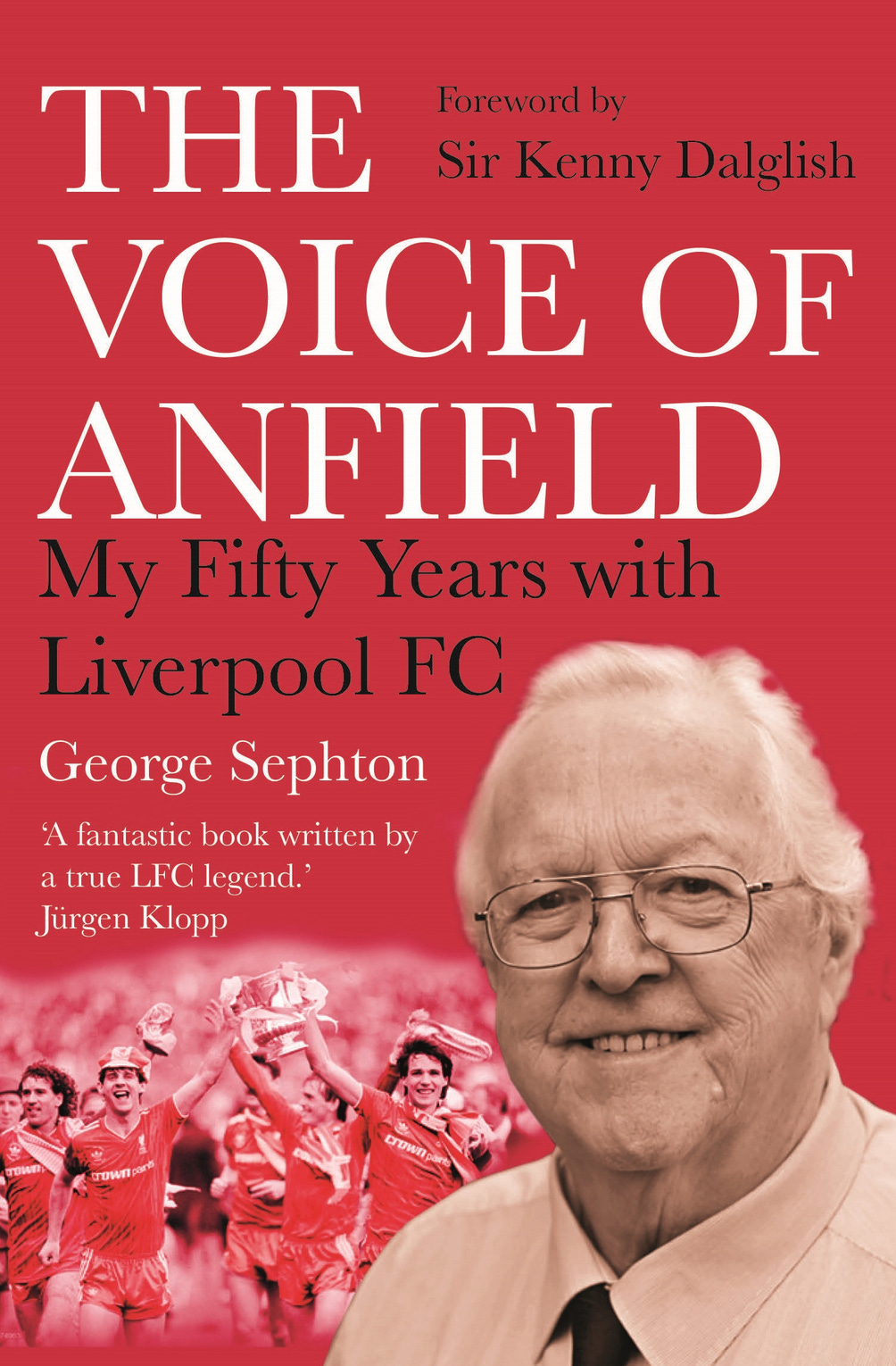Fifty Years of Music, Memories and Matchdays: George Sephton’s Liverpool
The definitive review of a book that reads like a walk through Anfield’s past
A Life in Red and Rhythm: George Sephton’s The Voice of Anfield
There are some voices in football that never leave you. The low murmur of the Kop swelling before kick-off. The strained roar of a last-minute winner. The mournful hush of a minute’s silence, disturbed only by the wind teasing at flags. And then there’s the one that echoes through all of them, George Sephton’s.
When Liverpool FC announced the news that Sephton was stepping down from his matchday duties at Anfield, it struck a chord far deeper than expected. The Voice of Anfield had become more than a title…it was a presence, a rhythm, a comfort blanket wrapped around the matchday experience. His departure marked the end of an era. That’s what prompted me to finally sit down and read his memoir. What followed was not just a look back at a remarkable life, but a poignant journey through the soul of Liverpool Football Club itself.
The Voice of Anfield is not just a memoir. It’s a hymnbook. It’s a behind the curtain tour of a life lived at the edge of the pitch, rooted in vinyl and shaped by glory. What Sephton has done is more than tell stories. He’s left behind a broadcast in ink and for anyone who’s ever heard him call out the names of Dalglish, Gerrard, or Salah, it resonates like the final lines of You’ll Never Walk Alone.
Reading this, I felt like I was walking arm-in-arm down Walton Breck Road with the man himself.
The Lad on the Kop Who Got the Mic
There’s a magic in the idea that Sephton’s Anfield career started the way so many of ours did, on the terraces. Growing up in post-war Liverpool, he was a regular on the Kop, a young lad watching legends like Billy Liddell and Alan A’Court. His father, a devoted Red, once wrote fifty postcards to the club in a desperate bid to win an FA Cup final ticket. It’s these small, seemingly throwaway stories that provide the heart of the book. You can feel the cold crush of the terraces and the warm hum of hope running through them all.
And then there’s the day it all changed.
In 1971, during a home game against Newcastle, George pointed out an error on the Tannoy to his soon-to-be-wife Liz. She challenged him, could he do any better? He wrote to Peter Robinson and, not long after, was summoned into the club. “Put some ideas down on paper,” they told him. He did. And then came the music, the mic, the matchday routines that would become second nature for over fifty years.
What makes the book so effective is how Sephton treats his own rise not with grandeur, but with a Scouser’s shrug. There’s modesty, almost disbelief, in his tone. As if every single Saturday he’s still looking over his shoulder, half expecting someone to say, “Right lad, that’s enough, off you pop.”
Shanks, Kenny, and a Cast of Gods
What this book delivers in spades is time spent with the greats not just in recollection, but in vibe, tone, and lived in detail.
Bill Shankly, of course, looms large. Sephton recounts their only real run in, after a Youth Cup game in 1972, George had announced that Leeds were leading in their match across the Pennines. Shankly wasn’t impressed. “He ruined the atmosphere!” the boss thundered post-match. But three days later, Shanks passed George in the corridor, offered a nod and a quiet “Good morning, son,” and all was well. That’s football. That’s Liverpool.
Kenny Dalglish? Sephton refers to him with reverence, as if speaking of royalty in hushed tones. He was there for Kenny’s first goal, and there again as he led us to the Double in ’86, balancing the manager’s jacket with the number seven shirt.
There are touching nods to Gerrard, Souness, Clemence, Grobbelaar or the “Jungle Man from Africa” as George calls him. The stories never feel rehearsed. They’re told like one would over a pint in the players’ lounge. Just a word, a wink, a quip. The time McManaman and Fowler rocked up for a charity do. The moment Shankly’s widow Jessie requested Amazing Grace be played to honour Bob Paisley. The everyday becoming extraordinary simply because it happened at Anfield.
His tales of players from all eras, from Liddell and A'Court to Suarez and Henderson serve as a reminder of the club’s legacy not just as a team, but as a living tradition. These aren’t just men in shirts. They are characters in a saga where the lines between legend and everyday life blur beneath the floodlights.
Music and the Matchday Ritual
Some might say music doesn’t belong in football. George Sephton would say those people have never walked up the steps of the Kop to the opening bars of You’ll Never Walk Alone. He doesn’t just talk about music he lives it. Each era of Liverpool’s modern history is accompanied by a cultural soundtrack, from Elvis to Paul McCartney, Abba to Oasis.
One story sticks out. During a 1977 European night against St Etienne, he’d nearly missed the match due to Manchester traffic. Driving a Citroën 2CV, he arrived at Anfield with queues snaking past his usual parking spot. Clambering through the crowd, he just made it in time only to witness what he calls the greatest ten minutes of his life. Keegan’s drive, Kennedy’s goal, Fairclough’s surge. “The Kop were in cloud cuckoo land,” he writes. And you feel it.
He takes us through the evolution of sound at Anfield too from vinyl, to CD, to USB stick. There’s an oddly comforting domesticity to it. The man who plays the records that stir the hearts of 54,000 people used to carry them in borrowed crates from his mates. Now they sit on a memory stick. But the heart remains.
Sephton’s loyalty to local bands is another reminder that Anfield isn’t just a football stadium. It’s a cultural platform. From Liverpool’s indie scene to the classics, the tunes that bounce around the Main Stand and Kop long before kick-off are handpicked with love.
Hillsborough, Heysel, and the Hardest Days
Some books about Liverpool avoid the tragedies. Sephton does not. And he shouldn’t. Because he was there.
His account of Hillsborough is raw. His son Rob was there. He wasn’t. The wait for the phone call to confirm he was safe feels eternal even in the retelling. He spares no detail in the failures of the authorities, of the systems, of the blindness of blame. He captures that awful contradiction: relief that your own are safe, guilt that others are not.
Then Heysel. If his Hillsborough account is emotional, Heysel is haunting. Sephton was inside the stadium, in the announcer’s booth. He watched the wall collapse. He saw the bodies. UEFA ordered him to make an announcement to keep fans calm. He refused. “Do as you’re told!” they barked. “No,” he said. “There’s already been one bloodbath. I won’t be part of another.”
That act of quiet defiance is one of the most powerful moments in the book. George Sephton, the voice of Anfield, at war not with hooligans or police but with his own conscience and winning.
His refusal to reduce Heysel or Hillsborough to footnotes sets this book apart. These were defining moments, not only in the history of Liverpool Football Club but in Sephton’s own life. They shaped how he sees the game, the fans, and his own role within the stadium.
The Final Whistle at the Old Kop
As if the tragedy and triumph weren’t enough, Sephton treats us to the final days of the standing Kop. The details are perfect. The drizzle. The scarf-waving. The banners. Gerry Marsden’s final YNWA live from the pitch. The lad who invaded the pitch at full time just to stick one in the net a goal that didn’t count, but meant everything.
He speaks of the Kop as a person. Living. Breathing. Dying with dignity. It’s heartbreaking and beautiful and exactly as it should be.
The story of the last day of the old Kop has been told often, but never quite like this. Sephton was there on the mic, ushering in the final chorus. His account, gentle and deeply affectionate, reads like the last diary entry of a lifelong friend.
The Man in the Background, Always in Tune
You finish The Voice of Anfield and realise you’ve not just read about George Sephton you feel like you have met him. The man who never wanted the spotlight, yet became synonymous with the club. The man whose voice marked triumphs and tragedies alike, never louder than the crowd, but always just behind it.
He never claims centre stage. He doesn’t have to. His impact is in the atmosphere. In the way a song starts at just the right time. In the calm, steady rhythm of his announcements. He is part of the architecture. As much a fixture as the floodlights.
If you want ghostwritten fluff, this isn’t it. The Voice of Anfield is a Liverpool book for Liverpool people. It doesn’t sensationalise. It doesn’t try to make George more than he is. Instead, it lets him be exactly what we’ve always known him to be, the understated man in the booth, whose words have marked the rise and fall of Liverpool Football Club for half a century.
And yet, by the time you close the final page, you realise you’ve just read something remarkable. Sephton’s life, for all its modesty, is rich with stories that belong not just to him, but to all of us. He’s lived the dream. He’s stood with Shankly, sung with the Kop, cried at Hillsborough, cheered at Istanbul, and cued up every note of our shared soundtrack along the way.
If you’ve ever been to Anfield and felt something you couldn’t quite put into words, George Sephton just did it for you.



